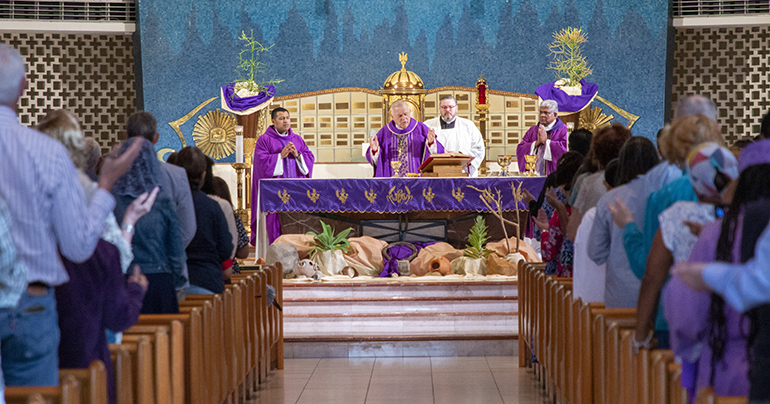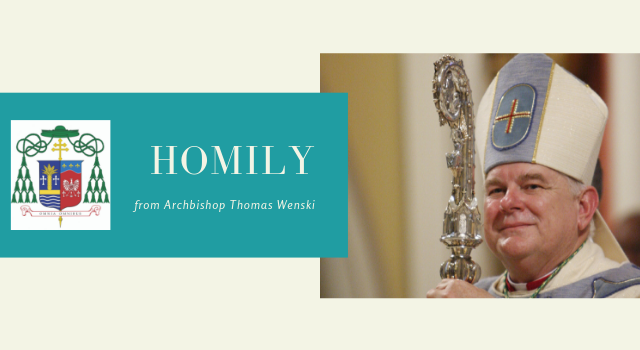By Archbishop Thomas Wenski - The Archdiocese of Miami

Photographer: ANA RODRIGUEZ-SOTO | FC
Archbishop Thomas Wensk celebrates the Mass that opened the conference on "The Eucharist: Our Source and Summit," March 4, 2023. As part of its 75th anniversary celebration, and in an effort to revive the Eucharist and Catholic culture, St. Rose of Lima Parish in Miami Shores hosted theologians Scott Hahn and John Bergsma of the St. Paul Center for Biblical Theology.
Archbishop Thomas Wenski preached this homily at a Mass marking the opening of a day-long conference on “The Eucharist: Our Source and Summit,” at St. Rose of Lima Parish in Miami Shores, March 4, 2023. The seminar featured authors and theologians Scott Hahn and John Bergsma.
I applaud Father George and the parishioners of St. Rose of Lima Parish for putting together this conference on The Eucharist: a fitting way to observe the Eucharistic Revival, a nationwide initiative to reaffirm our Catholic faith in the Holy Eucharist – Our Source & Summit of our Christian lives. I welcome our distinguished speakers, Dr. Scott Hahn & Dr. John Bergsma.
The Holy Eucharist – the Body and Blood, Soul, and Divinity of Our Lord Jesus Christ present in the Most Blessed Sacrament – is God’s gift for the life of the world.
God once fed the Hebrews who wandered in the desert in search of the Promised Land with manna, God continues to feed his people with the Holy Eucharist, food to strengthen us on our pilgrim journey through this “vale of tears.”
As the manna once sustained Hebrews, today to quote Pope Benedict, “the Eucharist is the indispensable food that sustains us as we cross the desert of this world, dried by ideological and economic systems that do not promote life, but repress it ... a world in which the logic of power and possession dominates, instead of the logic of service and love, a world in which the culture of violence and death often triumphs.”
In the Eucharist, Jesus knocks at the door of our hearts and asks to come in. Receiving our Lord in Holy Communion is, in fact, the privileged encounter with our Risen Lord. Like the Disciples of Emmaus who encountered him as they left Jerusalem sad and discouraged and who only recognized the Lord in the “breaking of the bread,” so too our encounter with the living Christ is intensified and deepened in the Holy Eucharist.
Before such a great Mystery, words can fail. But we can affirm that:
- The Eucharist awakens the hope of eternal life in those tempted to despair.
- The Eucharist opens to sharing those tempted to close their hands.
- The Eucharist highlights reconciliation rather than division.
- The Eucharist puts life – in all its stages from conception till natural death – and human dignity as the center of one’s faith commitment.
- In a society dominated by a culture of death in which search for individual comfort, money or power only intensifies, the Eucharist reminds us of the rights of the poor and the duty of justice and solidarity.
- The Eucharist awakens the Christian community to the immense gift of the new covenant that calls all humanity to go beyond itself.
Since the Eucharist is God’s gift for the life of the world, our encounter with the living Lord in Holy Communion brings with it also an urgent summons to testimony and evangelization. Like the disciples of Emmaus, once we have truly met the Risen One, we cannot keep to ourselves the good news and joy we have experienced. As Pope Francis tells us, we are to be “missionary disciples.”
Listen to this quote – and see if you can identify its author?
“ ... How can we exclude anyone from our care? Rather we must recognize Christ in the poorest and the most marginalized, those whom the Eucharist – which is communion in the Body and Blood of Christ given up for us – commits us to serve. As the parable of the rich man, who will remain forever without a name, and the poor man called Lazarus clearly shows, ‘in the stark contrast between the insensitive rich man and the poor in need of everything, God is on the latter’s side.’ We too must be on this same side.”
Some of you might guess Mother Teresa or maybe Pope Francis – for he has spoken eloquently of our need to reach out to those on the margins, the excluded, those deemed to be disposable. But the words actually come from the late great Pope St. John Paul II in a message he gave for a World Peace Day some years ago. He wished to remind Catholics that involvement in what are sometimes called “peace and justice” issues is not optional – nor it is the purview of those who would label themselves either “liberal” or “conservative.” Rather such involvement is a constitutive part of the living out of our faith. Solidarity as the late Pope once said is another word for justice in our day. It is “a firm and preserving determination to commit oneself to the common good.” This is an important corrective to the spirit of our times — with so much polarization.
To go back to the parable of Lazarus the Pope referred to in the quote above: the rich man was condemned not for anything he did (though certainly one can go to hell for doing bad things) but for what he did not do. A faith without works — without concrete engagement with the least of our brethren — is dead.
The Eucharist reminds us that our commitment as Catholics to work for peace and justice in the world is not born of some ideology or political platform; rather, it is born of a person, Jesus Christ. And therefore, our “solidarity” with the world of pain (and I like to remind people that here in South Florida, we are surrounded by islands of pain: Haiti, Cuba, Nicaragua, and Venezuela), our solidarity is a call to a commitment expressed in allegiance not to lofty propositions but to concrete persons in whom we are to see the face of Christ —this solidarity is lived out through the practice of what the Catechism calls the corporal and spiritual works of mercy. God takes the side of the poor, the oppressed, the marginalized — through the works of mercy, we take their side too.
Ita, Missa est. It is from these final words at the conclusion of the liturgy in Latin, the word, “Mass,” is derived. While it is translated, “Go, the Mass is ended,” it might be also better rendered as, “Go, it is the sending,” for Mass implies mission. “We cannot ascend” to the dwelling place of God, to quote Pope Benedict again, except “by going out on the roads of the world, carrying the Gospel to all nations, carrying the gift of its love for men at all times.”

